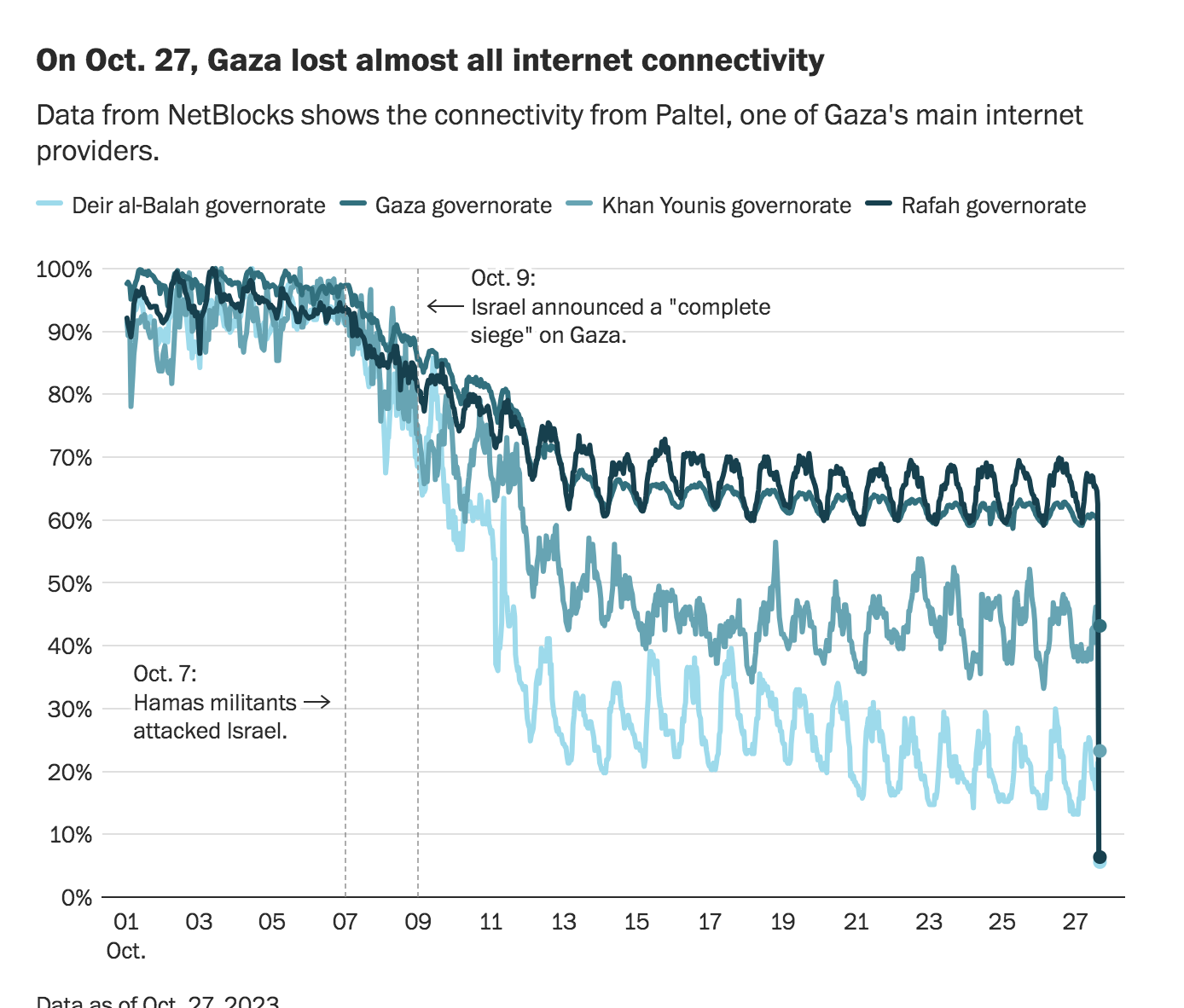Washington DC: The impact of the siege was almost immediate. Palestinians enduring the relentless bombings night after night are doing so in darkness.

Power supply in the Gaza Strip plummeted
By October 16, most sectors in the Gaza Strip had experienced a 90 percent drop in power availability since October 6.
Without electricity, aid groups warn, hospitals are collapsing and sewage plants cannot operate. The United Nations said this week that a desalination plant in the territory could stop running, leaving people without clean drinking water.
Even before Friday’s blackout, the lack of power and reduced internet access had already further isolated Palestinians in Gaza, making it harder for them to stay in contact with one another and with the outside world.
“We can barely write a text message to reassure our loved ones about our well-being,” said Alaa Ahmed, 20, a medical student. Before the airstrikes, she loved drawing. She would post time lapses of her illustrations on Instagram. But she hasn’t posted since September, and the notebook containing five years of artwork is lost — buried somewhere under rubble.
People are charging their phones in places like hospitals and pharmacies. They try to conserve their batteries for several days. The fortunate have solar panels and share that electricity with their neighbors.
“We can hardly find out about the news of our friends after days,” Alaa said. “We don’t know whose house was bombed, who was killed and who survived.” Powering up her phone on Wednesday brought devastating news: Her friend Bessan and her whole family were killed a week ago.
The Israeli military withdrew from Gaza in 2005. When Hamas seized power in 2007, the country imposed a strict blockade — bolstered by Egypt — on the territory. Gaza depends on Israel for basic services such as medical supplies and drinking water, as well as most of its electricity.
Israel provides Gaza with power in two ways. Its sole power plant is operated by diesel fuel that typically enters the enclave from the Karem Shalom crossing, which is currently closed. There are also 10 direct power lines from Israel to Gaza, which are now shut off.

The two main sources of electricity in Gaza are Israel’s electricity company, which supplies power through 10 lines, and the Gaza power plant, which frequently runs at partial capacity because of its reliance on inefficient diesel fuel. Gaza has not been able to obtain electricity from Egypt for several years.
Aid has begun to trickle into the strip through the Rafah crossing with Egypt, but Israel has refused to allow fuel for generators and the power plant, saying it would be used by militants to power rockets.
Gazans are deprived of their most basic needs and long for the simple pleasures of life.
“I miss taking a hot shower and diving into a bathtub full of water,” said Shayma Ahmed, 20, a student at the Islamic University of Gaza, which Israel bombed last week. Without reliable internet, she said, students have paused their studies.
Shayma’s neighbor has power from solar panels that he shares with her. She uses the internet to share her stories with the world but yearns for the way things were before the war and the blackout.
“I miss having a proper meal with my family and then having my favorite dessert, brownies, which I loved to make with my sister using our electric oven,” she said. “I miss watching TV shows and YouTube videos on the TV that we had recently purchased after saving up and put in our room.”
“To put it simply, I miss my life that used to exist before,” Shayma said.
As of Friday evening in Gaza, The Washington Post was unable to reach Alaa and Shayma.
Laris Karklis and Louisa Loveluck contributed to this report.
Courtesy :The wahsingtonpost




COMMENTS